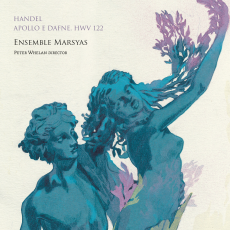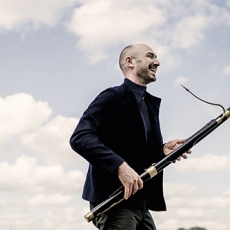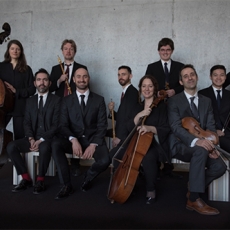Ensemble Marsyas - Handel: Apollo e Dafne - Andrew Benson-Wilson
Handel's early works, particularly those written during his period in Italy have a very special vitality, musical elegance and sense of melodic delight. The secular cantata Apollo e Daphne is one such, started in Venice in 1709, but not completed until he briefly moved to Hanover, in 1710, as Court Kapellmeister to the Elector of Hanover. It is the music performed during his time in Hanover that is the focus for this recording from the Irish/Scottish Ensemble Marsyas. Apollo e Daphne lacks an overture, so the curiously lengthy example from Il pastor fido has been included here, although at more than half the length of the cantata it makes for an unnecessary imbalance to the following cantata. That imbalance is further exaggerated by adding two curious Arias in F for wind band between the overture and cantata (here with added percussion), with a segue between the second Aria and the opening recitative of Apollo e Daphne. It's a rather odd musical construction, but that should not detract from the many delights of this recording.
The silly story of Apollo e Daphne provides many opportunities for Handel's sense of musical drama to be explored, along with with some gorgeous melodic moments from the two singers and, particularly, from the many solo and obligate instrumental contributions. And it is the latter that make this such an impressive recording. Ensemble Marsyas was founded by members of the European Union Baroque Orchestra (EUBO), the outstanding training orchestra for young professional musicians and the career start for many leading early music performers. Since expanded, and now including many players from the Dunedin Consort (including the brilliant leader, violinist Cecilia Bernardini), their playing in consort and solo is outstanding, notably from Cecilia Bernardini, Katharina Spreckelsen, oboe (pictured), Carles Cristobel, bassoon, Graham O'Sullivan, flute, and cellist Sarah McMahon.
Both vocal roles, here sung by Mhairi Lawson as Dafne and Callum Thorpe as Apollo, allow for plenty of dramatic contrast which both singers exploit to the full. Both slightly overdo their more gutsy moments, shifting into overly 'operatic' mode, but both excel in their gentler and more lyrical contributions, notably in the final moments after Daphne turns herself into a laurel tree, as you do. Director Peter Whelan demonstrates an empathy with the music and the dramatic undertones. He is listed as conductor, harpsichord player and bassoonist, so his hands must have been full during recordings.


